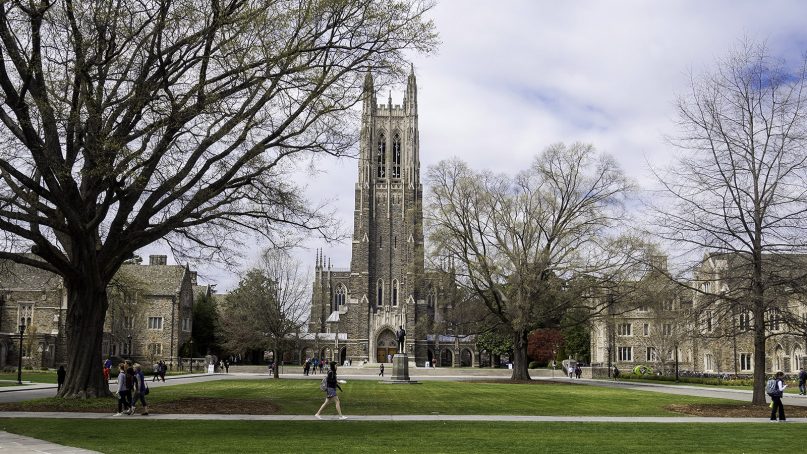Jewish parents: be ready for your kids calling you from campus.
It might not be about “please transfer money into my account.”
It might be about something that you might not have expected.
On college campuses, there is a growing sense that the mood is turning not only anti-Israel, but anti-Jewish and anti-Judaism.
- At Hofstra University on Long Island. An Orthodox Jewish student told her professor that she would need to miss class for the Days of Awe. He told her that she should re-evaluate her religious beliefs.
- In another incident at Hofstra, a student in class compared Jewish in-marriage to Nazi eugenics. When a Jewish student told the professor that she was uncomfortable, he told her that she should be less sensitive.
- At Duke University and the University of North Carolina — the joint Middle Eastern studies program. That program has not only shown a bias against Israel. ); it also betrays a bias against Judaism and Christianity, focusing only on Islam as a religion of the Middle East.
Earlier this year, that consortium hosted a conference on Gaza. One of the presenters at this high-profile conference was the Palestinian rapper Tamer Nafar. He told the audience that he wanted to sing them a song, but that he needed their help singing it, because “I cannot be anti-Semitic alone.”
- At Tufts University, a Jewish student found a swastika flag on his door.
According to Bari Weiss (How To Fight Anti-Semitism) this is becoming the new normal on college campuses. Jewish students find that their core beliefs and very existence is under threat — that the word “Zionist” itself has become a casual slur. Read her new book,
Because, in a world of uber-sensitivity and trigger warnings, there is one group that apparently does not deserve such sensitivity.
You got it.
It’s the Jews.
I cannot say that this is new.
I encountered it myself, more than forty years ago, when I was a student on the college campus. The casual and vitriolic anti-Israelism, from both students and professors (and this, in the wake of the Yom Kippur War) was searing.
I do not often get nostalgic about my college days, but let me tell you this story.
One of my classmates actually told me something unbelievable.
She told me that Theodor Herzl had secret meetings with Adolph Hitler – which proved that the Zionists had been in cahoots with the Nazis.
Which is interesting – because when Herzl died in 1904, Hitler was fifteen years old.
Since the day that I graduated from college, many fads have come and gone.
Remember disco? Gone.
Remember leisure suits? Gone – thank God.
Lava lamps? Gone.
There is one fad that is still around.
Anti-Israelism.
And — I think — anti-religion.
Even with the plethora and veritable explosion of Jewish studies programs on campus, I have a sneaking suspicion that in many academic settings, religion and faith claims should, well, know their place.
As well they should, perhaps. In places that value rationalism and evidence-based claims, we can understand why religious claims would not be entirely admissible. These are the fruits of the Enlightenment, now close to three hundred years old — and it would be useless and unhelpful to try to reverse that history.
But, outright hostility?
Re-visit the experience of the young woman at Hofstra University who told her professor that she would be absent due to the coming Days of Awe.
Her professor told her that she should re-evaluate her religious beliefs.
What did he mean by that?
Did he mean that she should re-evaluate her religious beliefs — as a Jew?
Or, did he mean that she should re-evaluate her religious beliefs — because they were, in fact, religious beliefs?
Again, a moment from my own college days.
I will never forget something that happened during my first week in college — in 1972.
It was in a psychology class. The professor had asked us to prepare statements on how our ideas had changed over the years — in many different areas — politics, culture, religion, etc.
In my statement, I said that I had evolved and changed in many ways — but that if there was one thing that had remained strong, resolute, and even growing — it was my religious faith as a Jew.
The professor asked me to meet him in his office.
This is what he said to me.
“Jeff, I wanted to meet with you, because I am very worried about you.
“What worries me about you is your absolute lack of rebellion against your religion.”
By the way — the professor was Jewish.
So, it’s not only about Israel, or Zionism.
It might be about having a particular, specific identity that is most often (erroneously) identified with being white and privileged.
It might be that identity politics on campus and in certain leftist circles are only valid if those identities are of the dis-empowered (forgetting, for the moment, all of Jewish history).
And, it might also be that having a religious identity — or, at least, certain kinds of religious identities — is simply, well…
Not. Cool. For. School.
I am thinking about the book burnings on the grounds of Humboldt University in Berlin, in 1933.
This past July, my son and I visited the sobering memorial to those destroyed volumes.
Please remember: who gathered the books into massive bonfires?
The students themselves.
The only question I have: will our Jewish students be able to stand up for, and stand up against, and stand out?






